Python使用ldap3操作微软AD
发布时间:2019-09-24 08:36:13编辑:auto阅读(3127)
对于client连接ldap server的策略,ldap3提供了4种选择,可以通过client_strategy设置Connection object应用哪种策略:
l SYNC
l ASYNC
l RESTARTABLE
l REUSABLE
同步策略(SYNC, RESTARTABLE),所有的ldap操作返回True/False
异步策略(ASYNC, REUSABLE)返回一个msgid(一个数值),异步策略发送请求后不用等待响应,需要响应的时候直接使用get_response(message_id)获取结果。等待响应的超时时间可以通过get_response的timeout参数指定,默认10s。如果使用get_request=True in the get_response(),同时会返回发送的请求字典。
建立连接:




建立Server对象时使用get_info=ldap3.ALL参数,建立Connection连接之后可以获取到server信息(匿名获取),从中可以获取到域名信息,域控计算机名,ldap server支持的Extension和Control
建立Server时指定 active=True,建立连接前会先检查ldap server的可用性;active=5指定抛出 LDAPServerPoolExhaustedError异常之前重试的次数
exhaust=True : 如果ldap server不时active,server将会从pool中移除。exhaust=10:设置为数值,表示认为server 10s不可达,则认为它为offline,
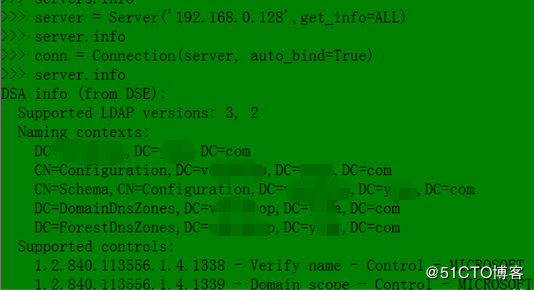
When all servers in a pool are not available the strategy will wait for the number of seconds specified in ldap.
POOLING_LOOP_TIMEOUT before starting a new cycle. This defaults to 10 seconds.
The pool can have different HA strategies:
• FIRST: gets the first server in the pool, if ‘active’ is set to True gets the first available server
• ROUND_ROBIN: each time the connection is open the subsequent server in the pool is used. If active is set to
True unavailable servers will be discarded
• RANDOM: each time the connection is open a random server is chosen in the pool. If active is set to True
unavailable servers will be discarded
A server pool can be defined in different ways:
server1 = Server('server1')
server2 = Server('server2')
server3 = Server('server1', port=636, use_ssl=True)
• explicitly with Server objects in the init:
server_pool = ServerPool([server1, server2, server3], POOLING_STRATEGY_ROUND_
˓→ ROBIN, active=True, exhaust=True)
• explicitly with an add operation in the pool object:
server_pool = ServerPool(None, POOLING_STRATEGY_ROUND_ROBIN_ACTIVE)
server_pool.add(server1)
server_pool.add(server2)
server_pool.add(server3)
44 Chapter 1. Contents
ldap3 Documentation, Release 2.5
• implicitly directly in the Connection object init (passing a list of servers):
conn = Connection([server1, server2, server3]) # the ServerPool object is
˓→ defined with the default pooling strategy
Pools can be dynamically changed. You can add and remove Server objects from pools even if they are already used
in Connection:
server4 = Server('server2', port=636, use_ssl=True)
server_pool.remove(server2)
server_pool.add(server4)
Connections are notified of the change and can reopen the socket to the new server at next open() operation.
You can also save the schema and info in a json string:
json_info = server.info.to_json()
json_schema = server.schema.to_json()
or can have them saved on file:
server.info.to_file('server-info.json')
server.schema.to_file('server-schema.json')
to build a new server object with the saved json files you can retrieve them with:
from ldap3 import DsaInfo, SchemaInfo
dsa_info = DsaInfo.from_file('server-info.json')
schema_info = SchemaInfo.from_file('server-schema.json')
server = Server('hostname', dsa_info, schema_info)
ldap server的Schema数据库中存储了ldap server中的对象的已知类型信息,可以通过server.schema获取到(微软AD需要鉴权,匿名用户无法获取),里面存储了ldap server理解那些数据类型,同时也指定,哪些属性被ldap server中的对象支持
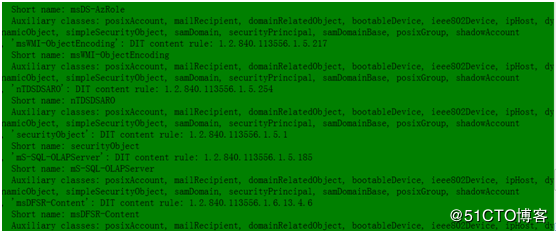
使用鉴权用户连接ldap server后可以查看server.shema等高级别操作。查看当前鉴权用户信息。以下连接使用的不安全的连接,密码信息明文传输,可以被抓取。使用authentication=ldap3.NTLM的鉴权方式无法显示的看到鉴权信息。



可以使用以下方式建立安全连接,2种方式都是建立TLS连接:
l LDAP over TLS
l the StartTLS extended operation ##微软AD不支持
ldap查询
ldap查询基于search_base和search_filter,filter是个表达式:
l 查询所有显示名叫John并且email以‘@example.org’结尾的用户:(&(givenName=John)(mail=*@example.org))
l 查询显示名为Jhon或者Fred并且邮箱以@example.org结尾的用户
(&
(|
(GivenName=Jhon)
(givenName=Fred)
)
( mail=*@example.org)
)
搜索search_base下的所有用户,默认search_scope='SUBTREE',没有指定请求任何attribute,只返回entries的distinguished Name,请求成功(同步strategy)返回True,conn.entries获取查询到的结果:
conn.search(base_search,'(objectclass=person)')
conn.entries

可以使用访问字典或者访问对象属性的方式访问从server上获取到的attribute值,有些属性不区分大小写,raw_values获取到的是从server返回的原始的值:

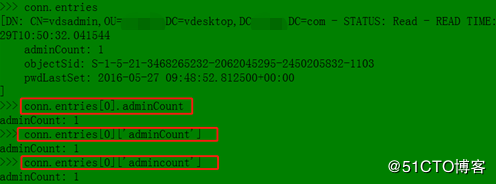
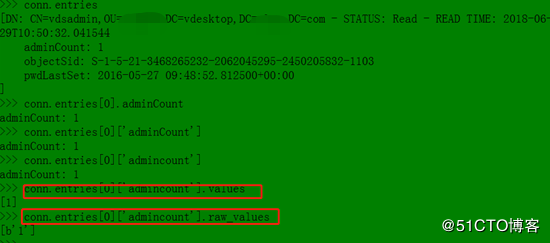
返回的entry可以格式化为json字符串

如果查询的属性的值为空,返回的entries中将不包含此属性,除非在Connection中指定return_empty_attributes=False,微软AD中貌似不起作用。

对ldap server进行search操作之后,Connection有以下属性可以访问:

在AD上增加entry,第一个参数为增加的对象dn,第二个参数为object_class,指定创建的object的类型,第三个参数为object提供的个性化attribute:

域控支持的objectclass可以通过server.schema获取到,创建不同类型的objectclass支持哪些attribute可以通过server.schema.object_classes['user']方式获取到,大多数attribute在创建object的时候都是可选的,必选参数会单独列出:
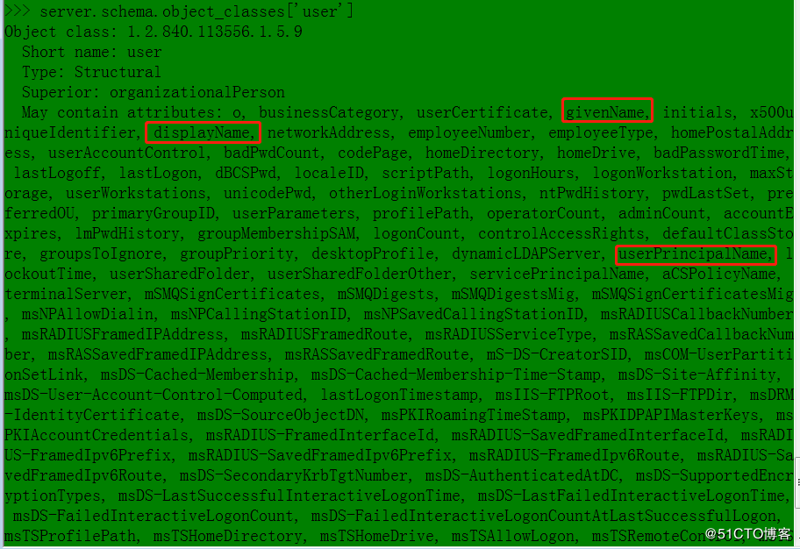

重命名一个dn,利用modify_dn提供的参数new_superior=new_dn,还可以将dn从一个ou移动到另一个ou:


检查object的属性是否和给定值一样。

上一篇: 3 . python Collectio
下一篇: python2和3搭建,pip2和pip
- openvpn linux客户端使用
52054
- H3C基本命令大全
51920
- openvpn windows客户端使用
42147
- H3C IRF原理及 配置
38994
- Python exit()函数
33493
- openvpn mac客户端使用
30444
- python全系列官方中文文档
29080
- python 获取网卡实时流量
24110
- 1.常用turtle功能函数
24018
- python 获取Linux和Windows硬件信息
22369
- LangChain1.0-Agent-部署/上线(开发人员必备)
117°
- LangChain1.0-Agent-Spider实战(爬虫函数替代API接口)
150°
- LangChain1.0-Agent(进阶)本地模型+Playwright实现网页自动化操作
163°
- LangChain1.0-Agent记忆管理
148°
- LangChain1.0-Agent接入自定义工具与React循环
174°
- LangChain1.0-Agent开发流程
161°
- LangChain1.0调用vllm本地部署qwen模型
182°
- LangChain-1.0入门实践-搭建流式响应的多轮问答机器人
187°
- LangChain-1.0入门实战-1
186°
- LangChain-1.0教程-(介绍,模型接入)
199°
- 姓名:Run
- 职业:谜
- 邮箱:383697894@qq.com
- 定位:上海 · 松江
